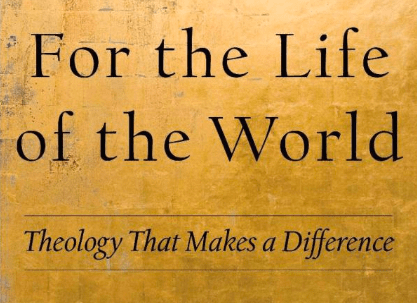 Miroslav Volf and Matthew Croasmun contend, contrary to its dry-as-dust reputation, that theology is for the flourishing life in their new and very important manifesto: For the Life of the World.
Miroslav Volf and Matthew Croasmun contend, contrary to its dry-as-dust reputation, that theology is for the flourishing life in their new and very important manifesto: For the Life of the World.
We believe the purpose of theology is to discern, articulate, and commend visions of flourishing life in light of God’s self-revelation in Jesus Christ. The flourishing of human beings and all God’s creatures in the presence of God is God’s foremost concern for creation and should therefore be the central purpose of theology.
So, what’s the flourishing life?
How would you define a flourishing life? What are its elements? Does Christianity lead toward the flourishing life? Does your gospel or theology or church lead to a flourishing life?
Simply: “the good toward which humans are meant to strive” (13). The “good life” or the “true life” etc.. World religions all bring into focus the flourishing life. Thus, there are three elements in the flourishing life:
Each world religion or philosophy gives an account of life going well, life led well, and life feeling as it should.
(1) Life going well refers to the “circumstantial” dimension of the flourishing life, to the desirable circumstances of life—be they natural (like fertile, uncontaminated land), social (like a just political order or a good reputation), or personal (like health and longevity).
(2) Life led well refers to the “agential” dimension of the flourishing life, to the good conduct of life—from right thoughts of the heart and right acts to right habits and virtues.
(3) Life feeling as it should is about the “affective” dimension of the flourishing life, about states of “happiness” (contentment, joy) and empathy.
This, then, is what we mean by a vision of flourishing life: a set of explicit or implicit convictions about what it means for us to lead life well, for our life to go well, and for it to feel right, convictions that guide—or should guide—all our desires and efforts.
Is this search for a flourishing life common to humans? Yes, they say:
All human beings in all cultures, each in their own way, aspire to genuine flourishing, their own and that of those they care for. First, we are inescapably oriented toward some good—toward things, states of affairs, practices, and emotions we perceive as good. Second, we are reflective and moral beings. We want to know that the good we strive toward is in fact desirable. Finally, aware as we are of living in time, we gather our past in memory and our future in anticipation, and we want to be assured of the goodness or Tightness of our whole life.
They think the language of “chasing your dream” is a cheap substitute for the flourishing life. Pursuing the resources necessary for a flourishing life is another cheap approach: the means become the end. When it becomes taste and preference, life becomes arbitrary.
Universities are failing us.
Churches are failing us.
It’s time for theologians to lead the quest for the flourishing life.











